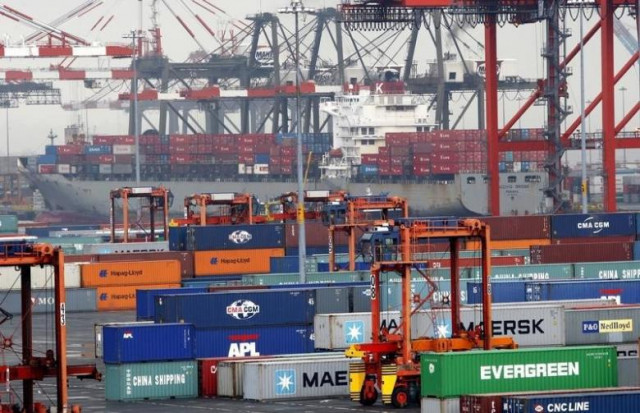Some US metals importers resigned to higher prices as Trump's tariffs bite
Recent govt shutdown added to wait that has stretched to eight months without ruling

Recent govt shutdown added to wait that has stretched to eight months without ruling. PHOTO: REUTERS
Importers, ranging from pipeline giant Kinder Morgan Inc to a steel tube manufacturer Sanitube, have submitted some 64,000 requests to avoid tariffs of 25% on steel and 10% on aluminum that President Trump ordered last March, according to the latest Commerce Department data obtained by Reuters.
The sheer number of requests, a late decision to allow appeals and the 35-day government shutdown that ended last week, have left more than half the petitions without a decision.
When the Trump administration evoked a rarely-used national security clause to impose the tariffs, it offered relief to companies that struggled to find home-made substitutes and many importers were optimistic they could secure exemptions.
US, China face deep trade, IP differences in high-level talks
Yet out of the 64,000 requests submitted by hundreds of companies, the administration has so far approved around 14,700 and rejected 5,450, according to Commerce. Around 10,000 have been returned without action due to filing errors, Commerce said.
Now, some importers say they have all but given up on relief, assuming higher prices are there to stay, acting as a lasting drag on their business and, more broadly, on the whole economy.
Sanitube LLC, a Florida-based supplier of stainless steel tubes for the food and other industries filed two similarly-worded exclusion requests for different sized products last year. One application, for a much larger volume, was denied as “incomplete” and the other was granted. Sanitube President Todd Adams, estimates that denial had cost it hundreds of thousands of dollars.
“I’ve basically written it off,” Adams told Reuters. He said he still planned to re-submit a request for relief, but called the quest to overturn the initial rejection “a pet project.”
“I’ve moved on,” Adams said.
Texas-based Heat Transfer Tubular Products, which makes parts for the oil and gas industry, lost a ruling last year and has not even sought a reconsideration, said Janese Sokulski, vice president of sales.
As decisions on requests for relief drag on, companies are passing on as much of the extra cost as they can to consumers, while absorbing the rest. Some foreign suppliers are also covering some of the costs to stay competitive in the US market.
While the tariffs helped curb imports and bolster domestic steel industry, they have increased costs for auto, construction, food service and energy companies. The Federal Reserve’s January 16 “Beige Book” snapshot of economic conditions pointed to tariffs as contributing to rising costs in several regions of the United States.
Commerce ministry framing tariff policy
Originally, the government said most exemption applications could be processed in about 90 days. But an uproar over the number denied led to an extended review process for contested applications and significantly longer wait times.
“I think the Trump Administration’s method is burnout. There is a path towards exemption, but it’s very difficult,” said Lisa Goldenberg, president of wholesale steel distribution firm Delaware Steel Company, which works closely with steel market participants.
“They started off saying ‘I’m really important, I’m a critical need, there’s no way this administration, who loves me, is going to hurt me,” Goldenberg said about the petitioners. “They have totally different language now.”
A Commerce spokesman said the expanded review was a “worthwhile addition to the exclusion process,” and that it “welcomed all valid exclusion requests and has dedicated resources to render determinations as expeditiously as possible.”
The spokesman added that requests could be processed faster if it had obtained authorisation from Congress to allocate more funds to the process. It requested to reallocate $5 million from other parts of Commerce’s budget, but so far has only been allowed to reallocate $3.3 million for the review.





1733130350-0/Untitled-design-(76)1733130350-0-208x130.webp)











COMMENTS
Comments are moderated and generally will be posted if they are on-topic and not abusive.
For more information, please see our Comments FAQ